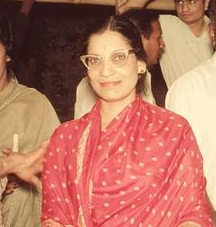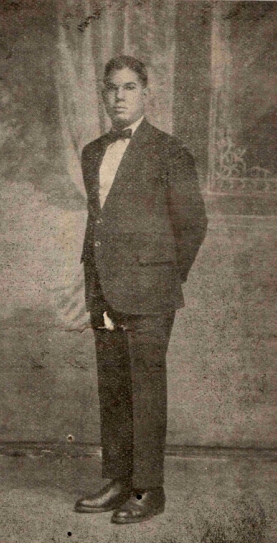Related Research Articles

Irene Jai Narayan was an Indian-born teacher and politician, who had a significant influence on politics in Fiji. She came to Fiji in 1959 after marrying Jai Narayan, a well known school Principal in Suva, and began her career as a teacher. She taught in DAV Girls School and MGM High School in Suva before entering politics.
Sadhu Vashist Muni was a Hindu missionary from India, who came into prominence in Fiji when he assumed the leadership of the strike in the western districts of Fiji in 1921. Mystery surrounded him during his short stay in Fiji and tales of his miraculous deeds still circulate in Fiji. The Government could not find out much about him from its sources of intelligence but deported him in the belief that he was an agent of Gandhi. After his arrest, the Government House in Suva was struck by lightning and destroyed which only heightened the belief in the power this mysterious sadhu.

Pt. Vishnu Deo OBE was the first Fiji born and bred leader of the Indo-Fijians. From his initial election to the Legislative Council in 1929 to his retirement in 1959, he remained the most powerful Indo-Fijians political leader in Fiji. He was a staunch supporter of Arya Samaj in Fiji and also the editor of the first successful Hindi-language newspaper to be published in Fiji.
Pandit Sukh Ram was an Indian politician who served as the Minister of Communications and Information Technology from 1993 to 1996. He was a member of Lok Sabha from the Mandi constituency of Himachal Pradesh. He won the Vidhan Sabha elections five times and the Lok Sabha elections three times. He is the father of politician Anil Sharma and grandfather of actor Aayush Sharma. In 2011 he was sentenced to 5 years in jail for corruption when he was Communications Minister in 1996.
James Ranchandar Rao was one of the three Indo-Fijians elected to the Legislative Council of Fiji in October 1929 when Indo-Fijians were given the first opportunity to elect their own representatives in the 1929 elections. The other two were Vishnu Deo and Parmanand Singh.
Parmanand Singh was one of the three Indo-Fijians elected to the Legislative Council of Fiji in October 1929 when Indo-Fijians were given the first opportunity to elect their own representatives. The other two were Vishnu Deo and James Ramchandar Rao. Singh was a landlord from Ba and undertook several business ventures which included publishing newspapers.
Kunwar Bachint Singh was an Indo-Fijian teacher and politician. He arrived in Fiji in 1927 as a teacher for the Arya Samaj but his association with Vishnu Deo led him to play an active role in aggressively promoting the Arya Samaj and finally into politics. He was elected into the Legislative Council as a protégé of Vishnu Deo but after the election took an independent stance opposed to the wishes of the majority of the Indo-Fijians. He supported nominated rather than elected representation, actively supported the war effort and even attempted to set up a farmers union opposed to a number of existing unions. The Government rewarded him for his loyalty by nominating him into the Legislative Council three times, appointing him as a Justice of the Peace and as the first Indo-Fijian member of the Executive Council.

The Arya Samaj was the first religious, cultural and educational Fiji Indian organisation established in Fiji. From its inception, in 1904, it attracted the young, educated and progressive Hindus into its fold. During the first three decades of the twentieth century, it was the sole voice of the Indian community in Fiji and as Fiji Indians won political rights, it was not surprising that first Indian members of the Legislative Council were all Arya Samajis. The influence of Arya Samaj over the Indians in Fiji gradually waned as other organisations representing Indians were established but it remained the dominant force in politics until 1959. The modern day Arya Samaj in Fiji still speaks out on issues affecting its members and its activities are visible through the numerous educational institutions that it manages.

Chandersen Chattur Singh was an Indo-Fijian politician. He caused a major sensation in the 1937 elections when he defeated A. D. Patel, a well known lawyer and political ally of Vishnu Deo.

Pandit Ami Chandra Vidyalankar was an Indo-Fijian educator, preacher, labour leader, politician and football administrator. He served as a member of the Legislative Council between 1947 and 1953.
Fiji Samachar was a Hindi language newspaper published in Fiji from 1924 to 1974. It was published in Suva by the Indian Printing and Publishing Company and its first editor was Babu Ram Singh.
The number of Fiji Indians that could be elected to the Legislative Council was fixed over the years as follows:
Mirza Salim Buksh was an Indo-Fijian community leader. One of the first Indo-Fijians to gain a formal education, he was chosen as one of the representatives of the Indian community on a number of occasions. He helped form and supported a number of social and religious organisations. He also served one term as a nominated member in the Legislative Council.
Shanti Dut is a Hindi language newspaper published weekly in Suva, Fiji and is owned by Mahendra Motibhai Patel. It is one of the oldest non-English language newspapers owned by the corporation having started in 1935. Its first editor and founder was Pundit Guru Dayal Sharma MBE, JP and Author of "Memories of Fiji 1887 to 1987.
Unlike the majority of Fiji's Indian population, who are descendants of Indian indentured labourers brought to Fiji between 1879 and 1916, most of the Sikhs came to Fiji as free immigrants. Most Sikhs established themselves as farmers. Sikhs also came to Fiji as policemen, teachers and preachers. In recent years large numbers of Sikhs have emigrated from Fiji, especially to the United States, Canada, the United Kingdom, Australia and New Zealand. Sikhs in Fiji are generally referred to as Punjabis. Total population of sikhs in Fiji is around 3600. Discourse on the experiences and histories of Fijian Sikhs tends to subsume them under discourse framed in terms of other South Asian groups.
The Indian Association of Fiji is the name used by organisations established in Fiji seeking to unite different groups within the Fiji Indian community to facilitate the plight of Indians in Fiji.

Avirbhav Verma is an Indian tabla player and percussionist who performs Hindustani classical music. He is the disciple and son of Pawan Kumar Verma, and grandson of Pandit Lachman Singh Seen of Punjab Gharana.

General elections were held in Fiji on 22 March and 8 April 1905.
References
- Sharma, Guru Dayal (1987). Memories of Fiji: 1887 - 1987. Guru Dayal Sharma, Suva, Fiji. pp. 94, 112.